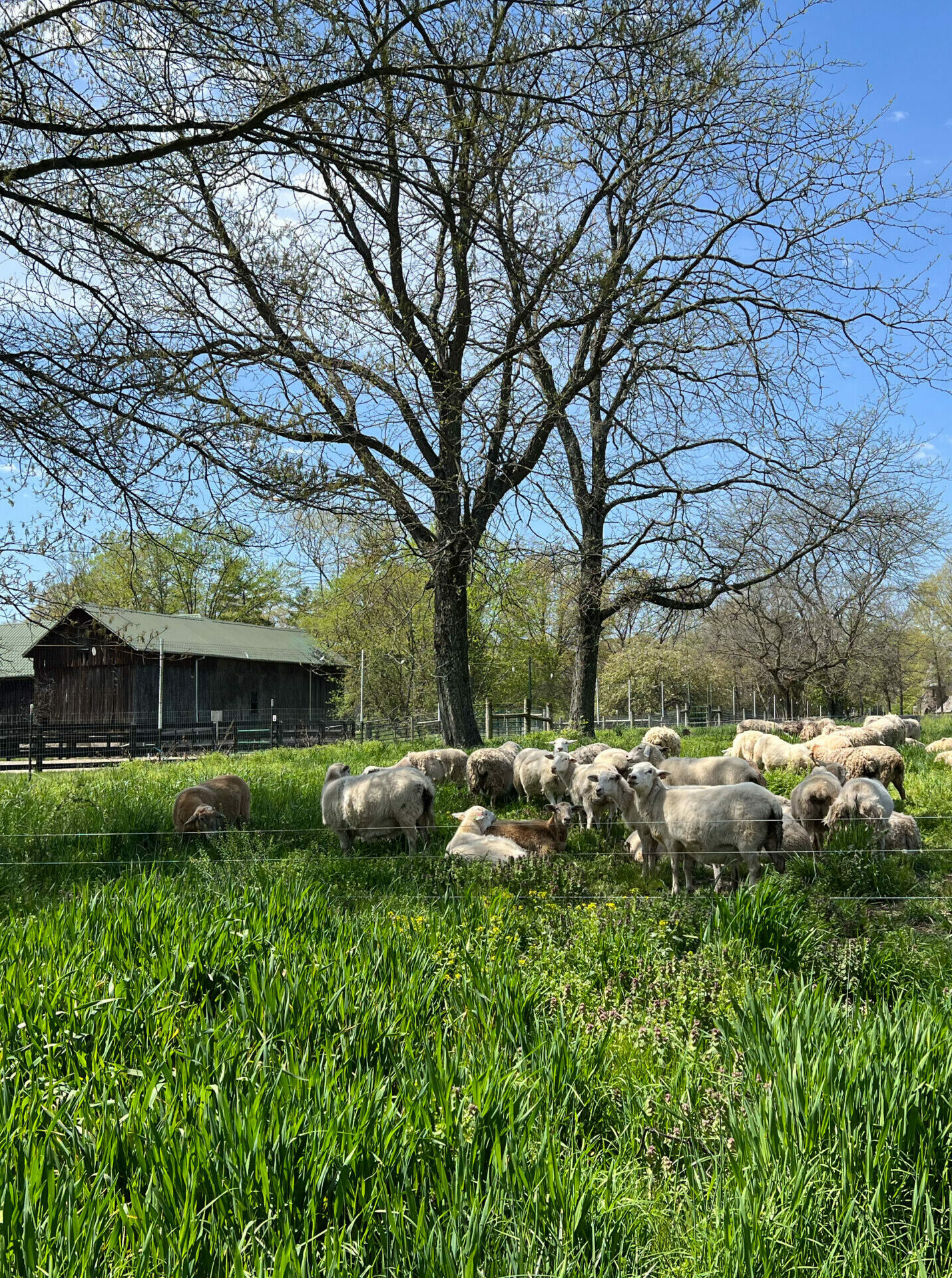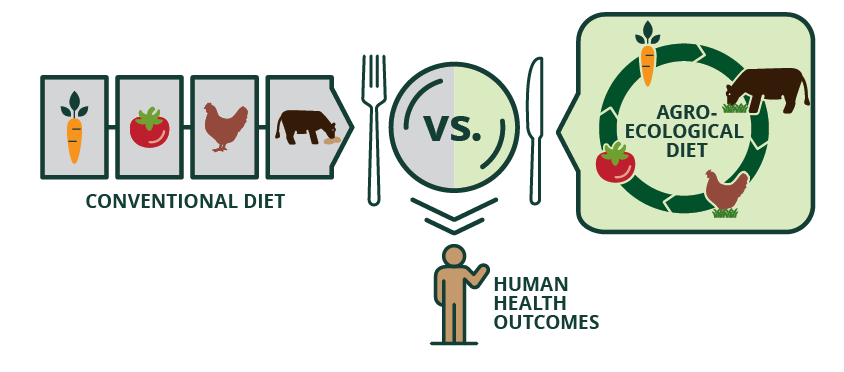REGENERATIVE FARMING SYSTEMS AND THEIR IMPACT
ON FOOD QUALITY AND HUMAN HEALTH
Overview
As concerns regarding the effects of conventional agriculture on human and environmental health mount [1, 2], a growing number of farmers are seeking ways to improve health from the ground up. One way farmers are “regenerating” health is by using agro-ecological practices (i.e., farming in harmony with nature) such as incorporating more diversity, and/or ley rotations (i.e. integrated crop-livestock systems) [3]. Regenerative farming practices can improve soil health [4, 5], nutrient cycling [2], water holding capacity [6], and stimulate biodiversity above and below ground [3]. Despite potential major ecological benefits, we lack critical knowledge regarding the benefits of food consumed from regenerative farming systems to human health. To address this question, Greenacres Foundation is partnering with Dr. Stephan van Vliet and Utah State University to investigate the impact that agricultural production practices have on crop and animal nutrients and ultimately the health of humans.
Project Overview

Regenerative agriculture focuses on building health from the ground up through the use of agro-ecological principles (e.g. diversity, livestock integration, increased plant cover, etc); however, little is known about how these practices impact human health outcomes. The purpose of this project is to test the hypothesis that consuming foods produced using “regenerative” (agro-ecological) practices improves consumer health compared to consuming similar foods from conventional farming systems. Without evidence-based knowledge on whether regenerative agriculture impacts human health, wide-scale adaptation of such environmentally beneficial farming practices will remain limited as the amplification of regenerative agriculture is driven by, and dependent on, consumer demand for healthy foods.
Work from Dr. van Vliet’s research group has recently found that regenerative grazing practices increase the amount and variety of health-promoting phytochemicals in meat and milk. These include terpenes, phenols, carotenoids, flavonoids, and other bioactive compounds with potential anti-inflammatory and cardioprotective effects [7]. These initial findings are meaningful, however an important next step is testing the effects that consuming a complete diet, rich in plant and animal foods produced using regenerative practices, has on human health.
Our approach
We are studying the 7-week consumption of a diet rich in regeneratively produced foods from Greenacres on markers of metabolic health, the gut microbiome, and circulating metabolomes of adults (30-60 y old). The regenerative based diet will be in comparison to the consumption of a macronutrient-matched diet with foods from a conventional system. In doing so, our work will seek to identify an initial critical—and largely unstudied—link between regenerative agriculture and human health.
The study began in June 2022 and the first-year participants completed their diet rotations by the end of November. In addition to monitoring the participants, soil, forage and fecal samples were taken from the production fields at Greenacres and will be analyzed for metabolites.

Collaborators

Greenacres Foundation Research Department
Founded in 2015, the Research Department at Greenacres Foundation explores connections between agricultural practices and outcomes on soil health, food quality, and the environment. The data collected through our research efforts helps inform consumers and producers about healthier, more sustainable farming practices and allows us to make better management decisions. Learn more at https://green-acres.org/research/
Utah State University – College of Agriculture and Applied Sciences – Nutrition, Dietetics & Food Sciences
Utah State University boasts small student to teacher ratios and fantastic learning labs including a dairy plant, a meat processing plant, and the only bean-to-bar chocolate factory at a U.S. university. Students explore the molecular and cellular levels of food, as well as understanding the building blocks of food and their impacts on consumers. They also learn how to create healthier diets, prepare better tasting foods, and gain a greater understanding of disease and increased food safety. https://caas.usu.edu/food-and-nutrition/index
Researchers

Chad Bitler
Research Director, Greenacres Foundation
Chad leads the Greenacres Research Department with a goal to explore connections between regenerative agricultural practices, responsible ecological management, and their outcomes on soil health, food quality, and the environment – which are all inextricably linked. The data collected from Greenacres research is aimed at inspiring land managers to instill regenerative practices that can provide positive impacts on their land. Chad graduated from University of Cincinnati with a M.S. in Nutritional Sciences. He has collaborated on research with notable land grant universities and organizations to help increase the collective knowledge surrounding regenerative practices.

Dr. Stephan Van Vliet
Assistant Professor | Nutrition Science, Utah State University
Dr. Stephan van Vliet is a nutrition scientist with metabolomics expertise in NDFS. He earned his PhD in Kinesiology as an ESPEN Fellow from the University of Illinois at Urbana-Champaign, and received training at the Washington University in St Louis School of Medicine and Duke University School of Medicine. Dr. van Vliet’s research is performed at the nexus of agricultural and human health. He routinely collaborates with farmers, ecologists, and agricultural scientists to study critical linkages between agricultural production methods, the nutrient density of food, and human health.
Research Updates
References
- Van Vliet, S., Kronberg, S.L., and Provenza, F.D. (2020). Plant-Based Meats, Human Health, and Climate Change. Frontiers in Sustainable Food Systems 4.10.3389/fsufs.2020.00128
- Kronberg, S.L., Provenza, F.D., Van Vliet, S., and Young, S.N. (2021). Review: Closing nutrient cycles for animal production – Current and future agroecological and socio-economic issues. Animal, 100285. doi: 10.1016/j.animal.2021.100285
- Wezel, A., Casagrande, M., Celette, F., Vian, J.-F., Ferrer, A., and Peigné, J. (2014). Agroecological practices for sustainable agriculture. A review. Agronomy for Sustainable Development 34, 1-20.10.1007/s13593- 013-0180-7
- Mcdaniel, M.D., Tiemann, L.K., and Grandy, A.S. (2014). Does agricultural crop diversity enhance soil microbial biomass and organic matter dynamics? A meta-analysis. Ecological Applications 24, 560-570. doi: 10.1890/13-0616.1
- Albizua, A., Williams, A., Hedlund, K., and Pascual, U. (2015). Crop rotations including ley and manure can promote ecosystem services in conventional farming systems. Applied Soil Ecology 95, 54-61. doi: 10.1016/j.apsoil.2015.06.003
- Altieri, M.A., Nicholls, C.I., Henao, A., and Lana, M.A. (2015). Agroecology and the design of climate changeresilient farming systems. Agronomy for Sustainable Development 35, 869-890.10.1007/s13593-015- 0285-2
- Van Vliet, S., Provenza, F.D., and Kronberg, S.L. (2021b). Health-Promoting Phytonutrients Are Higher in Grass-Fed Meat and Milk. Frontiers in Sustainable Food Systems 4.10.3389/fsufs.2020.555426
Contact Us
Department Director
Chad Bitler




